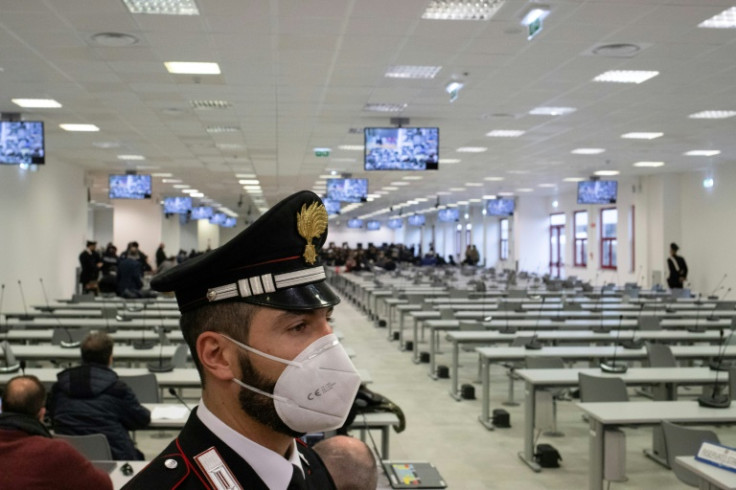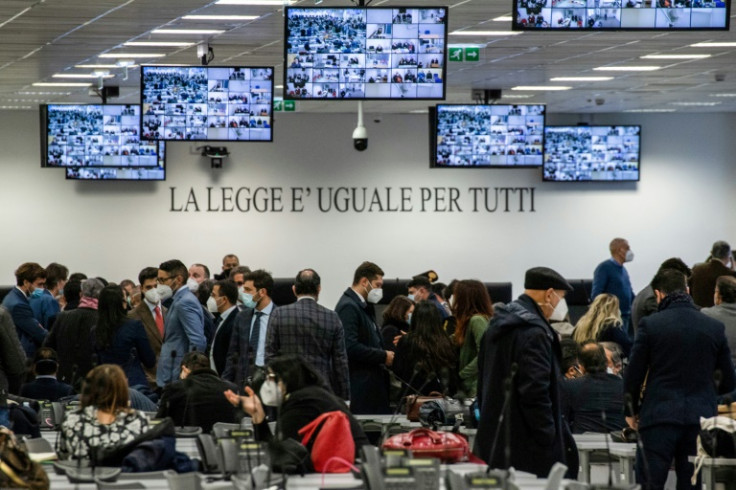Hundreds Of Mobsters Face Hard Time After Italian 'Maxi-trial'

Hundreds of alleged members of the 'Ndrangheta -- Italy's most powerful organised crime group -- and their white-collar collaborators face sentencing this week following a historic, nearly three-year trial.
Prosecutors have asked for prison sentences totalling nearly 5,000 years for 322 defendants, who bear nicknames like "The Wolf," "Fatty," "Sweetie," and "Lamb Thigh" and are accused of a dizzying array of offences.
Based in the poor southern region of Calabria, the 'Ndrangheta is Italy's wealthiest and most powerful criminal organisation, which has a near-monopoly on the European cocaine trade.
While it has stealthily expanded to now operate in more than 40 countries, back home the 'Ndrangheta has suffocated the local economy, infiltrated public institutions and terrorised its people for decades.
Since January 2021, three judges in Calabria have heard thousands of hours of testimony -- including from dozens of mobsters turned state's witness -- about the Mancuso clan and its associates, which control the province of Vibo Valentia.
"It's an important trial because it targets one of the most powerful 'Ndrangheta families based in Calabria, with international ramifications," mafia expert Antonio Nicaso told AFP.
The sentences could come this week.
Held in a heavily secured courtroom bunker, the trial in Lamezia Terme represents Italy's largest "maxi-trial" in more than 30 years, involving vast numbers of defendants accused of being part of the same criminal conspiracy.
Allegations include mafia association, attempted murder, drug trafficking, extortion, loan sharking, abuse of office and money laundering.
The undisputed boss of the Vibo Valentia province, Luigi "The Supreme" Mancuso, 69, was cut from the defendants list last year to be tried separately.
Mancuso spent 19 years in prison before going underground, but was captured as part of a massive police blitz in December 2019 in which more than 300 suspected mobsters were arrested.
Prosecutors have asked for 30 years each for a dozen of Mancuso's top associates in charge of selecting targets for hits or extortions and maintaining relations with other mafias.
But underscoring the 'Ndrangheta's success in infiltrating the legitimate economy, the defendants include public servants, professionals, mayors, and even a high-ranking police official. The highest-profile one is defence lawyer Giancarlo Pittelli, 70 -- a former MP and senator from ex-premier Silvio Berlusconi's Forza Italia party -- who faces 17 years for his alleged role as go-between with the world of politics, finance and illegal Masonic lodges.
Some 67 defendants who were part of the original indictment have already been sentenced, after opting for a speedy trial.
The trial's most colourful testimony came from more than 50 former mafia operatives turned state's witnesses -- including Luigi Mancuso's nephew, Emanuele.
They recounted long-buried secrets, from weapons hidden in cemetery chapels and ambulances used to transport drugs, to municipal water supplies diverted to marijuana crops.
Those who opposed the mafia discovered dead puppies, dolphins or goat heads on their doorsteps, torched cars or smashed up storefronts.
Less lucky ones were beaten or shot -- or their bodies were never found.
The courtroom is a former call centre converted to accommodate hundreds of lawyers, outfitted with more than 20 television screens piping in images of incarcerated defendants and informants by video link.
Initially dismissed as mere livestock thieves, the 'Ndrangheta flourished under the radar for decades as authorities concentrated efforts against Costa Nostra, the Sicilian Mafia depicted in "The Godfather" movies.
Today, experts estimate that the 'Ndrangheta, made up of about 150 Calabrian families and their associates, brings in more than 50 billion euros ($53 billion) annually around the world, from drug trafficking and usury to syphoning public funds and extortion, with illegal gains reinvested in the legitimate economy.
Italy has made inroads in recent years, training police departments around the world to recognise the 'Ndrangheta on their turf -- and make arrests.
But one crackdown is not likely to dramatically hinder the 'Ndrangheta, said Nicaso, citing the need for jobs, education and changing mentalities.
"That's what you need to challenge a criminal organisation."

© Copyright AFP 2025. All rights reserved.





















